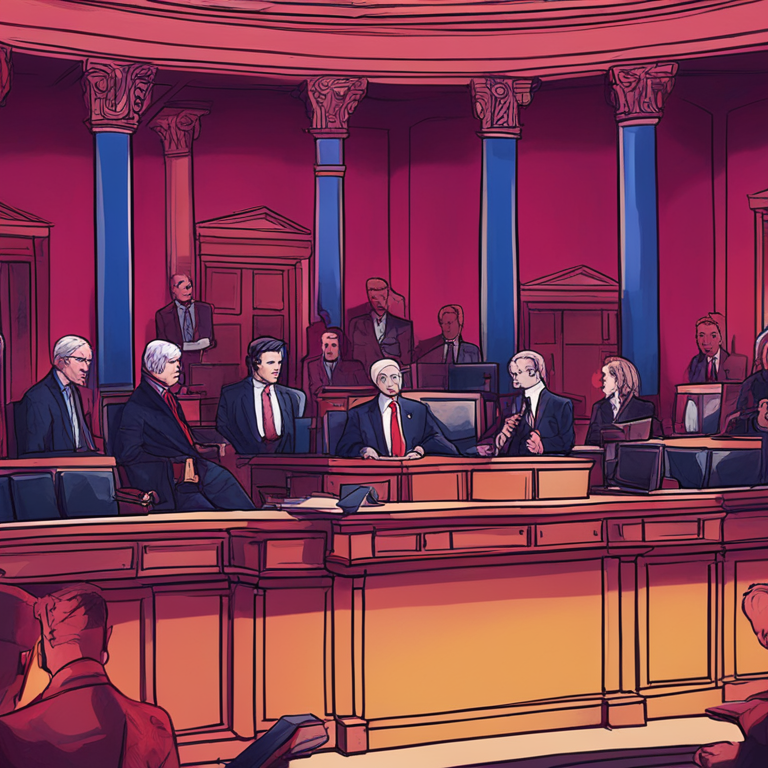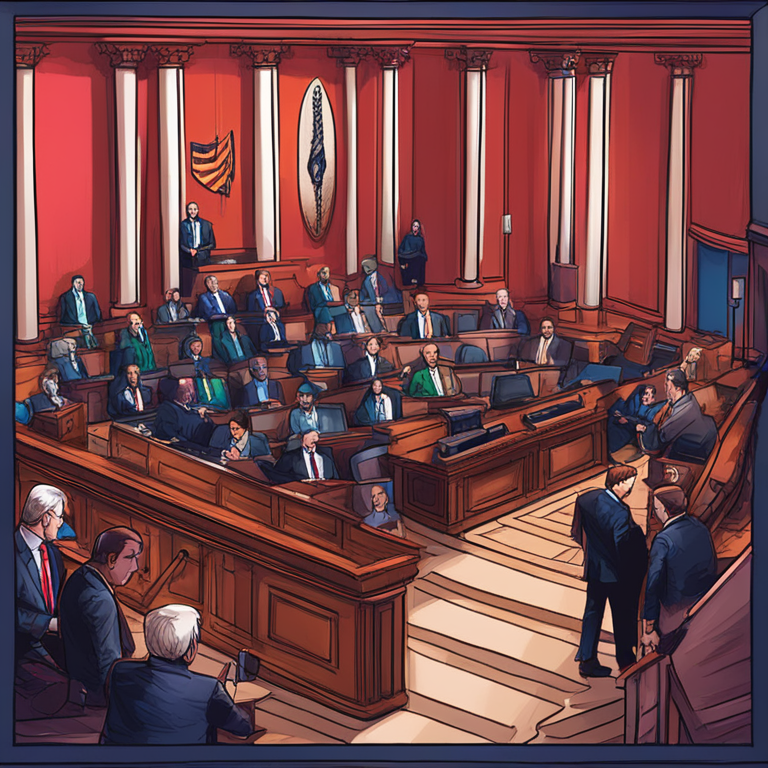U.S. Senate Votes to Kill SEC's Crypto Accounting Policy, Testing Biden's Veto Threat
- byAdmin
- 16 May, 2024
- 20 Mins

Introduction
What happens when the United States Senate, cryptocurrency, and the SEC cross paths? Well, we get a nail-biting political drama ripe for the next Netflix special. Recently, the U.S. Senate took a contentious step by voting to kill the Securities and Exchange Commission's (SEC) crypto accounting policy, leaving legislative enthusiasts and Bitcoin buffs on the edge of their seats. The decision isn't just about accounting regulations; it's a tug-of-war that could potentially tip President Biden's veto scale. Let's dive into the whirlwind event that's got everyone talking.
Senate vote on SEC's crypto accounting policy

Firstly, let's spill the tea on what went down in the Senate. They voted 60-38 to overturn the SEC's Staff Accounting Bulletin No. 121, lovingly known as SAB 121. The crypto community has been watching this like a hawk. Why? Because SAB 121 dictates that companies holding customer cryptocurrencies must record them on their own balance sheets. This could make life quite tricky for banks dabbling in the crypto space.
Intriguingly, this wasn't just a party-line vote. A dozen Democrats joined the Republicans to pass the resolution. Even Senate Majority Leader Chuck Schumer went rogue and bucked party lines to cast his vote against the SEC's policy. Not exactly your everyday bipartisan lovefest. But, before you pop the champagne, know this: the resolution didn't get enough votes to make it veto-proof. So, it's not yet game over.
Details of the Senate vote
The Senate's vote was historic—well, at least for the crypto realm. They grabbed the Congressional Review Act, dusted it off, and used it to tell SAB 121 to take a hike. For those uninitiated, the Congressional Review Act allows Congress to overturn federal rules with a simple majority. And Congress just gave the SEC a reality check.
The rowdy resolution also had a significant number of House Democrats cosigning it. In fact, 21 House Democrats were part of this predominantly Republican endeavor. They were essentially saying, "Sorry White House, but we think you're wrong on this one." And this was despite warnings from high up that killing SAB 121 could dribble some unwanted constraints onto the SEC's ability to tackle crypto issues in the future. Talk about a coup d'état, huh?
Biden's veto threat
President Biden, making a cameo appearance in this saga, has already promised to veto the resolution. He claims that removing the rule would mess up efforts aimed at "protecting investors in crypto-asset markets and safeguarding the broader financial system." Translation: Biden thinks overturning SAB 121 is like pulling out the Jenga piece that will collapse the whole tower.
If you think this makes the President sound like a cautious dad who's not ready to trust his teenager with the family car, you're not alone. Biden's stance isn't just about this one rule; it's about future-proofing crypto regulations. Killing SAB 121 through the Congressional Review Act means the SEC can't revisit something similar in the future—no do-overs, no second chances.
In this thrilling game, it's not just Wall Street and banks on tenterhooks. The entire cryptocurrency industry is holding its breath, waiting to see if Biden's veto will smash their dreams of a more accommodating accounting environment. Stay tuned, folks. If this saga has taught us one thing, it's that the crypto and political worlds are some serious roller-coasters.

SEC's Staff Accounting Bulletin No. 121 (SAB 121)
Hold onto your hats, dear readers! The U.S. Senate has made quite the splash by voting to squash SEC’s infamous Staff Accounting Bulletin No. 121, commonly known as SAB 121. This move, hotly debated and passionately argued, couldn't be more relevant to the crypto industry. While U.S. President Joe Biden might be sharpening his veto pen, it's worth diving into what SAB 121 actually entails and why everyone (and their blockchain dog) cares so deeply about it.
So, what's all the fuss about? SAB 121, issued in 2022, mandates that companies holding cryptocurrencies for customers reflect this on their balance sheets. Imagine the resulting capital implications, especially for banks enthusiastically embracing crypto clients. Some see this as prudent accounting; others view it as the SEC overstepping its bounds. Indignant lawmakers and industry leaders argue that it mucks up their financial statements, leading to elevated capital requirements that could stifle the booming crypto market. But as they say, the devil's in the details, and SAB 121 is chock-full of them.
Policy Impact on Banks

Bankers, brace yourselves. SAB 121 demands that any company holding cryptocurrencies for its customers must list these digital assets on their balance sheets. This seemingly simple mandate could have complex repercussions. Imagine if banks, traditionally more conservative institutions, need to now grapple with the wild-west volatility of cryptocurrencies. Cheers to sleepless nights for CFOs everywhere!
This policy would mean significant adjustments to capital ratios, potentially making banks cautious (if not downright averse) to engaging with crypto assets. Given the volatile nature of cryptocurrencies, banks' balance sheets could resemble a roller coaster more than a steady climb. It's like suddenly finding a wild stallion in your car garage instead of a trusty station wagon. Balancing act? More like circus juggling!
Republican Criticism of SEC Process
Now, onto the political theater. Many left-leaning folk might love a good regulatory mandate, but Republican lawmakers are having none of it. They've wagged their fingers at the SEC, accusing it of bypassing the proper rule-making process. To the GOP, it’s as if the SEC decided to wing it, adding such significant guideline changes as mere 'staff guidance' instead of a rule.
Supporting this criticism is the Government Accountability Office (GAO), which agreed that the SEC's handling of SAB 121 was all a bit of a botch. Essentially, the SEC applied a policy without properly going through the rule-making maze. Talk about cutting corners! Republicans argue this move undermines transparent governance and sets a precedent for regulatory freelancing, resulting in more disarray than clarity.
Congressional Review Act and Future Implications
Congressional Action under the Review Act
Here comes the cavalry! With torches in hand (metaphorically, of course), lawmakers in both the House and Senate have rallied against SAB 121 using the Congressional Review Act (CRA). This tool lets Congress torpedo federal rules they don't quite fancy. And boy, did they not fancy SAB 121!
The vote against SAB 121 saw bipartisan support, with a dozen Democrats crossing the aisle. They argued that by passing the CRA resolution, they would ensure the SEC doesn't spring such rules on the industry under the guise of 'guidance' in the future. It’s like Mom and Dad telling the SEC, “No more sneaking cookies before dinner!” If the CRA resolution succeeds, the SEC’s hands could be tied, preventing similar policies from unexpectedly blindsiding the market again.
White House Concerns on Regulatory Constraints
The White House, probably sipping on strong coffee, has flagged some serious concerns. Biden’s administration argues that if Congress knocks out SAB 121, it might hamstring the SEC's ability to regulate future crypto-asset-related quandaries. You know, the kind that might impact financial stability. The President's stance is that removing this rule without a solid replacement could leave regulators twiddling their thumbs in an increasingly crypto-dominated financial landscape.
From the White House's perspective, SAB 121 might be an annoying fly, but swatting it away could leave bigger, buzzier problems down the road. You can practically hear the sigh of frustration as Administration officials warn that dismantling SAB 121 via the Congressional Review Act will nix any similar regulations, potentially hobbling efforts to maintain necessary financial guardrails. Essentially, Biden is giving Congress the ol' “Think twice before you act” look.
In the end, what happens next in the tango between Capitol Hill and the White House over SAB 121 will significantly shape the regulatory future of the crypto industry. Whether the Senate's bold move will succeed or crash against a presidential veto, one thing's for sure: the crypto scene has just gotten a lot more interesting.

Senate's blazing showdown over SEC's controversial crypto accounting policy
The U.S. Senate has taken center stage in one of the most heated policy debates of the year, with legislators casting their votes to dismantle the SEC's notorious crypto accounting policy, dubbed Staff Accounting Bulletin No. 121. Despite a bold stance from President Joe Biden threatening to veto the resolution, the Senate barreled ahead, reflecting a formidable bipartisan effort. The final tally stood at 60-38, a clear signal that while the path to change gleams with potential, it's not entirely veto-proof. Talk about a political cliffhanger!
For those wondering what the fuss is about, SAB 121 issued in 2022, essentially required companies holding customers' cryptocurrencies to list these assets on their balance sheets—a move that could spell capital headaches for banks mingling with crypto clients. Many Republican lawmakers, and indeed a few Democrats, weren't exactly fans of this policy, accusing the SEC of bypassing its own rule-making processes. The Government Accountability Office actually chimed in with a melodious "we agree," stating that the SEC should have put on their official policy-making hat instead of their staff guidance cap.
And that’s not all; the plot thickens with the involvement of the Congressional Review Act, which Congress used to target SAB 121. This act, most likely dusted off from some corner of the legislative library, allows Congress to overrule federal regulations. If this legislative gambit succeeds, it tosses the SEC’s future attempts to sneak in similar policies into a legal void—that’s congressional judo for you! Spurred by this potential regulatory revolution, even Senate Majority Leader Chuck Schumer and a dozen other Democrats opted to dance with the GOP, opposing the SEC's crypto cadre.

The great crypto accounting debate: What’s at stake?
For context: SAB 121 wasn't just a snoozefest policy memo; it had teeth. By demanding that crypto assets held on behalf of others be reflected in the company's balance sheets, it pulled banks into a regulatory labyrinth, prompting financial headaches and potentially stymying the burgeoning crypto markets. The sentiment seems to be, why should Mr. Blocky McChain on Main Street have to put Grandma's crypto nest egg on his books? Many in the industry cried foul, and Congress listened—or at least enough of them to create a hold-your-breath moment of suspense.
President Biden's veto threat, however, adds a layer of political high drama. In a statement reminiscent of a stern parent ready to put the foot down, the President warned that removing the rule would upend efforts to protect crypto asset investors and safeguard the financial ecosystem. But hey, rules or no rules, one thing's clear: Congress is ready to go toe-to-toe with the administration over crypto. The kicker? This is one of the first congressional efforts to specifically address and aid the crypto industry, establishing a precedent that might just be the tip of the proverbial blockchain iceberg.
So, what does this mean for the future? If the Congressional Review Act resolution successfully torpedoes SAB 121, the SEC will find itself hamstrung for future regulatory jaunts into the crypto woods. On the flip side, failing to overturn the policy leaves the SEC's rule—and its potential financial quagmire for banks—firmly in place. It's like a Shakespearean play, but with more wires and less tights: economic consequences, political intrigue, and a tech-driven twist that keeps everyone guessing. Sit tight, the curtain’s still up on this one!
Ethan Taylor
Ethan Taylor here, your trusted Financial Analyst at NexTokenNews. With over a decade of experience in the financial markets and a keen focus on cryptocurrency, I'm here to bring clarity to the complex dynamics of crypto investments.



